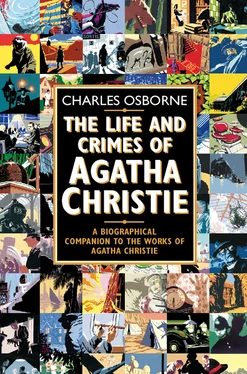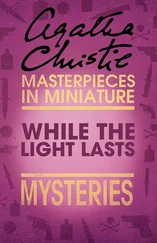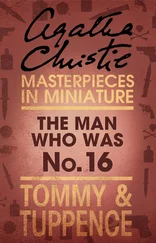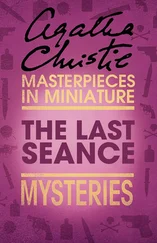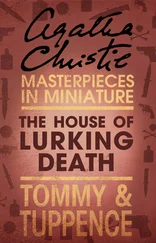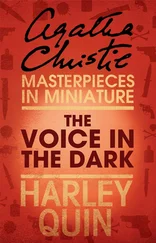1 ...6 7 8 10 11 12 ...29 In The Secret Adversary, the puzzle is the identity of the adversary. The Bolshevists, we are informed, are behind the labour unrest in the country, but there is a certain man who is ‘behind the Bolshevists’ (the italics are Mrs Christie’s). ‘Who is he?’ Mr Carter asks rhetorically:
‘We do not know. He is always spoken of by the unassuming title of “Mr Brown”. But one thing is certain, he is the master criminal of this age. He controls a marvellous organization. Most of the peace propaganda during the war was originated and financed by him. His spies are everywhere.
Tommy manages to eavesdrop upon a meeting of Mr Brown’s organization, at which various representatives report on their activities. A Sinn Feiner guarantees to produce, within a month, ‘such a reign of terror in Ireland as shall shake the British Empire to its foundations’. Others have infiltrated the trade unions: the report from the miners is thought to be most satisfactory, but ‘We must hold back the railways. There may be trouble with the ASE.’ It is important that the principal Labour leaders should have no inkling that they are being used by the Bolshevists. ‘They are honest men,’ says the representative from Moscow, ‘and that is their value to us.’
All good clean reactionary fun, and not without a certain absurd relevance to political life today! Those who take their politics solemnly, if anyone other than politicians is still able to do so, will probably reflect that The Secret Adversary gives an interestingly distorted picture of the social and industrial unrest which followed the First World War and which, during the years which saw the consolidation of the Russian revolution, was to lead to the General Strike in Great Britain, an event which is curiously anticipated in more than one of Agatha Christie’s early novels. But Mrs Christie is politically no further to the right in her thrillers than Ian Fleming in his distinctly less amusing James Bond novels of the nineteen-fifties and sixties.
The villain is unmasked at the end of The Secret Adversary and the threatened General Strike is averted or, as we now know, postponed. Inspector Japp has made, not an appearance, but a certain effect offstage, and the reader with a knowledge of nineteenth-century French opera will probably spot a certain clue which will leave those who suffer from amusia (the inability to comprehend or produce musical sounds) mystified.
The Secret Adversary was the first Agatha Christie novel to be made into a film. This did not happen until 1928, by which time Mrs Christie was being published in a number of foreign languages. The film, produced by Julius Hagen for a German company, was called Die Abenteuer Gmbh (Adventures Ltd), was directed by Fred Sauer, and starred Carlo Aldini, Eve Gray and a Russian character actor, Michael or Mikhail Rasumny, who was to appear in a number of Hollywood movies in the nineteen-forties and fifties.
A television adaptation of The Secret Adversary was first shown on London Weekend TV on 9 October 1983.
The Murder on the Links POIROT (1923)
Archie Christie had a friend, Major Belcher, who was a larger-than-life character with the ability to bluff people into giving him positions of responsibility. Belcher came to dine one evening with the Christies at Earls Court, and explained that he was shortly to leave on a grand tour of the British Empire in order to organize ‘this Empire Exhibition we’re having in eighteen months’ time’. ‘The Dominions,’ Belcher explained to Archie and Agatha, ‘have got to be alerted, to stand on their toes and to cooperate in the whole thing,’ and it was Belcher’s mission to ensure that they did so. He invited Archie to come with him as financial adviser, with all expenses paid and a fee of £1,000. Agatha would be permitted to accompany the party, since most of the transport was being provided free of charge by the ships and railways of the various Commonwealth countries to be visited.
Archie Christie had already grown tired of his job in the City, and when Belcher announced the proposed itinerary, from South Africa to Australia and New Zealand, then on to Canada after a brief holiday in Honolulu, the Christies agreed to go. Agatha longed to travel and see as much of the world as possible, but had expected that, as the wife of a business man, two weeks abroad each summer would be all she was ever likely to get. There was a certain risk to be taken, for Colonel Christie’s employer was not willing to guarantee to keep his job open for him on his return, but the Christies did not consider themselves to be people who played safe. Like Agatha’s Tommy and Tuppence, they yearned for adventure and were perfectly willing to take risks. Off they went, around the world with Major Belcher, leaving their daughter with Agatha’s sister.
The British Empire Exhibition Mission set off in grand style on the Kildonan Castle, bound for Cape Town. But Agatha Christie’s enjoyment was soon cut short: the weather in the Bay of Biscay was atrocious, the ship was tossed about violently, and for four days Agatha suffered the most appalling seasickness. The ship’s doctor became seriously concerned about her, and a woman in a nearby cabin who had caught a glimpse of her was heard, on the fourth day, to ask the stewardess: ‘Is the lady in the cabin opposite dead yet?’ However, her condition improved when the ship docked at Madeira, and although she subsequently became ill again whenever the weather was rough at sea, it was never quite as bad as those first days. In due course, the ship reached Cape Town, and Agatha was delighted to be back on terra firma for a time. By now, she had come to know Major Belcher quite well, and to realize that travelling around the world with him was not going to be the entirely happy experience she and Archie had anticipated. The Major was very demanding, complained continually about the service, and bullied his secretary, Mr Bates, a serious, somewhat humourless young man and an excellent secretary, though nature had given him ‘the appearance of a villain in a melodrama, with black hair, flashing eyes and an altogether sinister aspect’. ‘Looks the complete thug, doesn’t he?’ Belcher said to the Christies. ‘You’d say he was going to cut your throat any moment. Actually he is the most respectable fellow you have ever known.’ Neither Belcher nor his secretary realized that they were being scrutinized, analysed and filed away for future reference by a crime novelist always ready to make use of a colourful character or two.
From Cape Town Agatha travelled on to the diamond mines at Kimberley; to Salisbury and the Victoria Falls; to Livingstone where she saw crocodiles swimming about, and hippopotami; to Johannesburg, Pretoria and Durban. She and Archie managed to do a great deal of surfing at Muizenberg, in Cape Province, before facing the, in her case, dreaded sea voyage to Australia.
In Australia she was fascinated by the parrots, 5 Конец ознакомительного фрагмента. Текст предоставлен ООО «ЛитРес». Прочитайте эту книгу целиком, купив полную легальную версию на ЛитРес. Безопасно оплатить книгу можно банковской картой Visa, MasterCard, Maestro, со счета мобильного телефона, с платежного терминала, в салоне МТС или Связной, через PayPal, WebMoney, Яндекс.Деньги, QIWI Кошелек, бонусными картами или другим удобным Вам способом.
blue and red and green, ‘flying through the air in great clustering swarms’, and by the gigantic tree ferns in the bush outside Melbourne. The food and the sanitary arrangements left much to be desired, but staying on a sheep station in New South Wales was an unusual and enjoyable experience. In the major cities, Belcher made successful public speeches, or rather repeated the same speech which his travelling companions soon knew by heart. After visiting Tasmania, where Agatha fell in love with ‘incredibly beautiful Hobart’ and decided to go back and live there one day, the party proceeded to New Zealand.
Читать дальше
